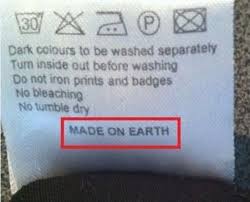Well-known clothing brands are producing their fashion goods in countries that the majority haven’t even heard of, yet are still selling more than ever. Do the ‘Made In’ Labels hold value anymore?
We will never really know if the luxury garment you just purchased was actually made in Paris, in reality; a button could have been sewn on in France and ‘Made in Paris’ was strategically printed onto the label, steering the consumer clear of their ethical questions about where the rest of the garment was made.
This is actually a thing; The Business Of Fashion states in their recent essay on this subject, that: “Companies need only spend a certain amount manufacturing a good in a certain country in order to qualify for local ‘made in’ labelling.”

With no doubt, these ‘Made In’ Labels are challenging human psychology, leading individuals to think that since their garment states that the product was made in the same country as some of the most ethical factories, instantly in the minds of consumers the label becomes an indicator that their clothing was produced in an ethical factory, with of course above standard health, safety, and wage regulations.
Advocates already have a connection with the brand when purchasing from high-end labels, as well as a loyalty to the designer, and an instant level of trust that the garment they are purchasing is going to be durable. So do they really care about where it was made?
Designer Rick Owen has his leathers made in Moldova… Many don’t even know where this country originates, but have no questions when it comes to buying, as they trust the quality and style that comes with Owen’s pieces.

The reality is, a garment could have been almost completely produced in a small factory in China with horrible working conditions, but if at least some of the product was produced in Europe the brand has a right to place whatever they wish on the ‘Made In’ Labels.
This leads to more questions; do consumers genuinly care where the product is made? Of course well-educated and aware consumers have a personal standard of ethics and will question the origin of the clothing that they choose to purchase. The majority of consumers, however, have less particular criteria, such as – do I look good in this?







